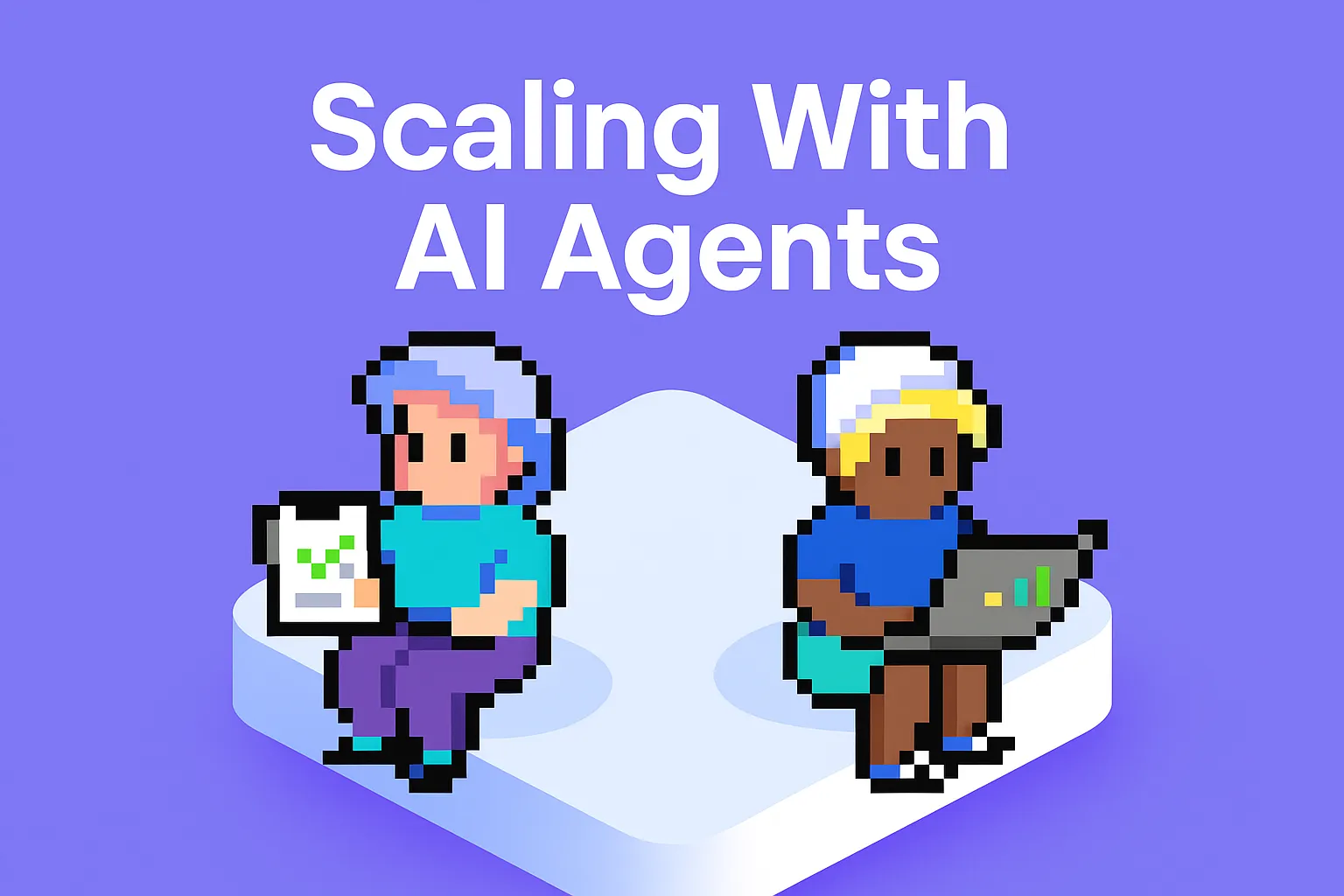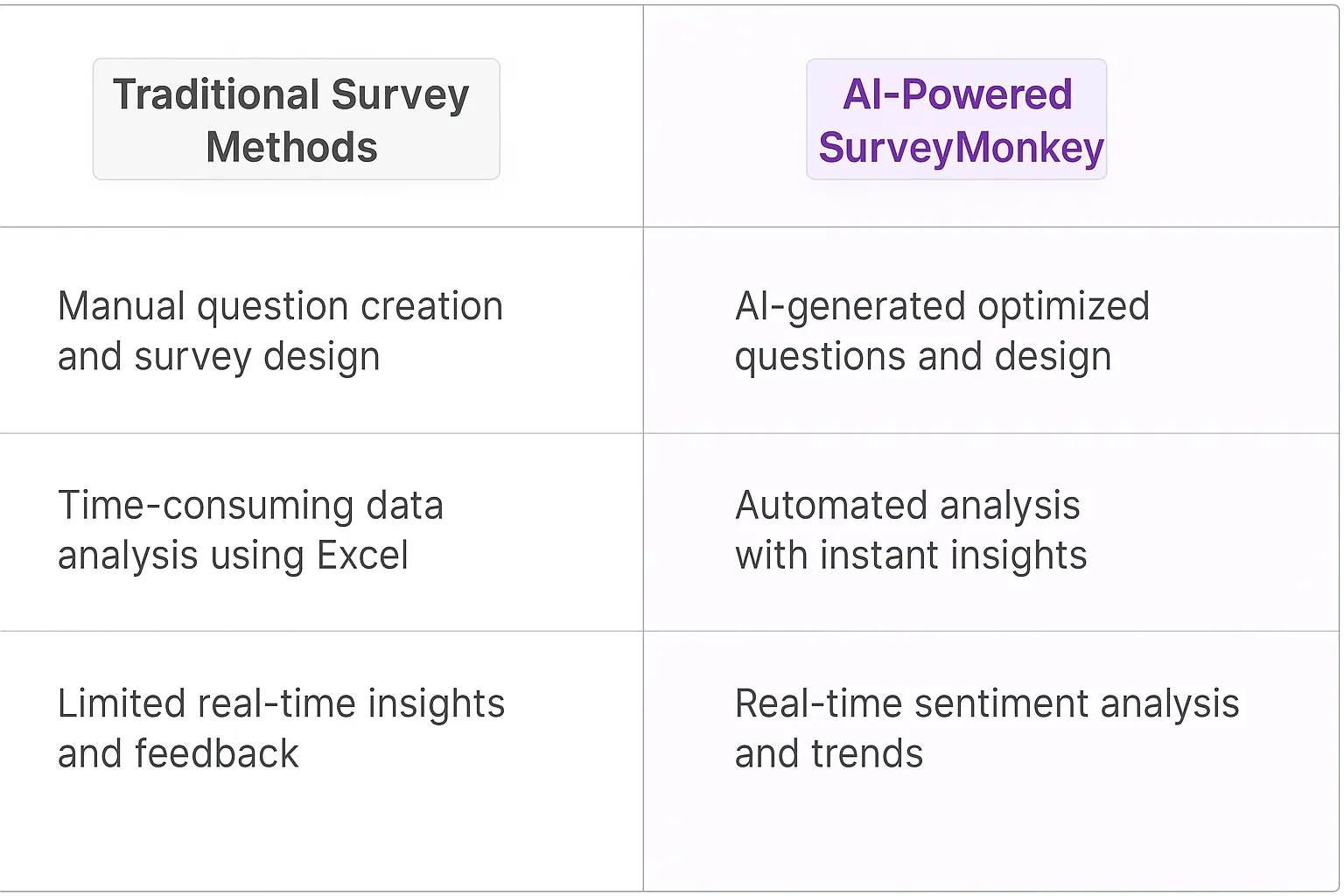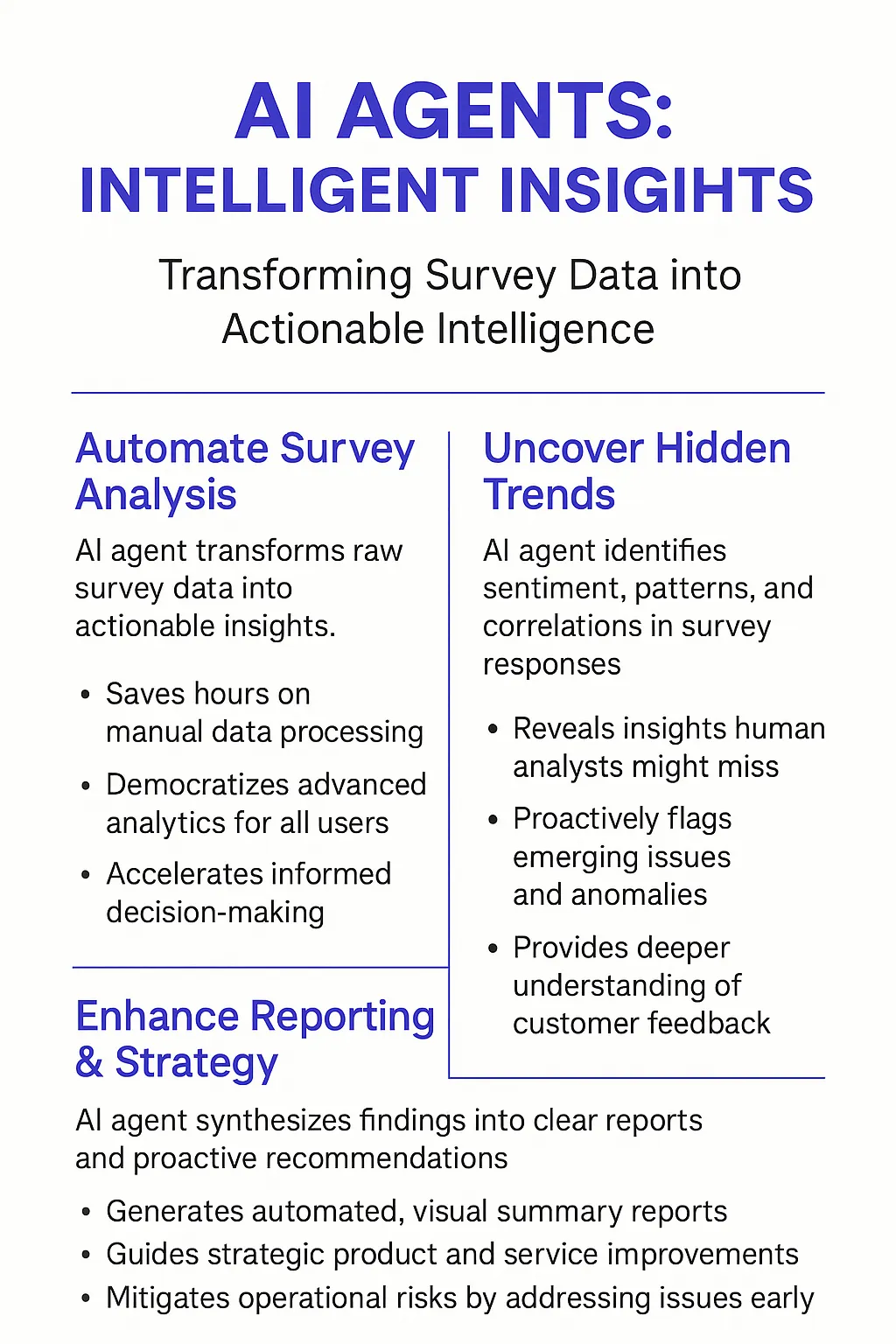Surveymonkey AI Agents
Understanding SurveyMonkey: A Leading Online Survey Platform
SurveyMonkey is a cloud-based survey tool that enables users to create, distribute, and analyze surveys with ease. It's the go-to platform for businesses, researchers, and individuals looking to gather feedback, conduct market research, or measure customer satisfaction. SurveyMonkey's user-friendly interface and robust features have made it a staple in the world of online data collection.
SurveyMonkey offers a wide array of features that set it apart in the survey software market. These include customizable survey templates, advanced logic and branching options, real-time results, and detailed reporting capabilities. The platform also provides integration with various third-party tools, making it a versatile choice for businesses of all sizes. With options for both individual users and enterprise-level solutions, SurveyMonkey caters to a diverse range of survey needs.

Benefits of AI Agents for Surveymonkey
What would have been used before AI Agents?
Before AI agents entered the scene, Surveymonkey users were stuck in a world of manual labor and guesswork. They'd spend hours crafting questions, agonizing over survey design, and then crossing their fingers hoping for decent response rates. Data analysis? That was a whole other beast. Users would export CSV files, fire up Excel, and pray they remembered enough from that one stats class in college. It was like trying to build a skyscraper with a hammer and a prayer.
What are the benefits of AI Agents?
Now, with AI agents, Surveymonkey is playing a whole new ballgame. These digital teammates are like having a team of PhD statisticians and UX designers on speed dial, but without the attitude or the hefty consulting fees.
First off, AI agents are crushing it in survey design. They're not just spitting out generic templates; they're analyzing your goals, your audience, and even the latest research on survey methodology to craft questions that actually get answers. It's like having a survey savant whispering in your ear, "Trust me, you want to ask it this way."
But the real magic happens when the responses start rolling in. AI agents are turning data analysis from a chore into a superpower. They're spotting trends you'd need a magnifying glass and a lot of caffeine to find. They're segmenting your audience in ways that would make a marketer weep with joy. And they're generating insights that don't just answer your questions, but make you ask better ones.
Here's the kicker: these AI agents are learning and improving with every survey. They're like employees who never sleep, never complain, and somehow get smarter every day. They're turning Surveymonkey from a tool into a partner, one that's as invested in your success as you are.
In the end, AI agents are doing what great technology always does: they're not just making us more efficient, they're expanding what's possible. They're turning every Surveymonkey user into a data scientist, a master communicator, and a decision-making ninja. And they're just getting started. Welcome to the future of feedback, folks. It's going to be one hell of a ride.

Potential Use Cases of AI Agents with Surveymonkey
Processes
AI agents are poised to transform how we approach survey creation and analysis with Surveymonkey. These digital teammates can dive deep into the nuances of survey design, offering a level of sophistication that goes beyond simple template selection.
One key process where AI shines is in survey optimization. By analyzing past survey performance and engagement metrics, an AI agent can suggest tweaks to question order, wording, and even survey length. This iterative improvement process, traditionally time-consuming and often subjective, becomes data-driven and efficient.
Another critical process is respondent segmentation. AI agents can sift through vast amounts of demographic and behavioral data to identify meaningful segments within your survey audience. This granular approach allows for more targeted survey distribution and personalized follow-ups, potentially increasing response rates and data quality.
Tasks
When it comes to specific tasks, AI agents can be game-changers for Surveymonkey users. Let's break down a few high-impact areas:
1. Question formulation: AI can generate nuanced, unbiased questions that elicit more accurate responses. It can also flag potentially leading or confusing questions, helping maintain survey integrity.
2. Real-time analysis: As responses come in, AI can provide instant insights, allowing survey creators to pivot or dig deeper on emerging trends without waiting for the full data set.
3. Natural language processing of open-ended responses: AI excels at categorizing and extracting sentiment from free-text answers, turning qualitative data into quantifiable insights.
4. Cross-survey correlation: AI agents can identify patterns across multiple surveys, uncovering hidden relationships between different data sets that humans might miss.
5. Predictive modeling: By analyzing historical survey data, AI can forecast future trends or predict how certain changes might impact survey results.
The integration of AI agents into Surveymonkey isn't just about automation—it's about augmentation. These digital teammates enhance human creativity and decision-making, allowing survey creators to focus on strategy and interpretation while AI handles the heavy lifting of data processing and pattern recognition.
As we continue to push the boundaries of what's possible with survey technology, the synergy between human intuition and AI capabilities will unlock new levels of insight and understanding. The future of surveys isn't just about asking questions—it's about asking the right questions, to the right people, at the right time, and interpreting the answers in ways we've never imagined before.

Industry Use Cases
The versatility of AI agents in Surveymonkey makes them valuable across various industries. Let's dive into some meaty, industry-specific use cases that showcase how AI can transform workflows and processes. These aren't your run-of-the-mill examples; we're talking about AI that's so integrated, it feels like it's been part of the team since day one.
We're not just skimming the surface here. We're going deep into the trenches of how AI is reshaping the survey landscape across different sectors. From healthcare to tech startups, from education to market research, AI is not just a fancy add-on. It's becoming the backbone of how we gather, analyze, and act on data.
So, buckle up. We're about to explore how AI agents in Surveymonkey are turning what used to be a simple survey tool into a powerhouse of insights across industries. This isn't about incremental improvements; it's about fundamental shifts in how businesses operate and make decisions based on data analysis.
Market Research Reinvented: SurveyMonkey AI in Action
Let's talk about how SurveyMonkey AI is reshaping the market research landscape. This isn't your grandma's survey tool anymore - we're entering a new era where AI acts as your personal research assistant on steroids.
Picture a boutique marketing agency. They're juggling multiple clients, each demanding laser-focused insights yesterday. Enter SurveyMonkey AI. This digital teammate doesn't just collect responses; it's actively mining for gold in that data mountain.
The AI dives deep, identifying patterns human analysts might miss. It's not just spitting out percentages; it's connecting dots across demographics, spotting emerging trends, and even suggesting follow-up questions based on initial responses. This isn't just data analysis; it's predictive insight generation.
But here's where it gets really interesting: natural language processing. The AI can parse through open-ended responses, categorizing sentiments and extracting key themes without human intervention. It's like having a team of expert coders working 24/7, but without the coffee breaks and salary negotiations.
For our marketing agency, this means delivering client insights at warp speed. They're not just faster; they're smarter. The AI flags counterintuitive findings, challenges assumptions, and even suggests strategic pivots based on the data. It's turning survey results into strategic goldmines.
The ripple effects are huge. Clients get more bang for their buck. The agency punches above its weight class, competing with firms ten times their size. And let's not forget the end consumers - they benefit from products and services that actually address their needs, not just what some exec thought was a good idea.
This isn't just an incremental improvement. It's a fundamental shift in how we understand markets and consumers. SurveyMonkey AI isn't just a tool; it's becoming an indispensable partner in the insight generation process. And for industries that live and die by consumer understanding, that's a game-changer.
SurveyMonkey AI: Transforming Healthcare Patient Feedback
The healthcare industry is ripe for disruption, and SurveyMonkey AI is leading the charge in revolutionizing patient feedback. This isn't just about replacing paper forms with digital ones - we're talking about a fundamental shift in how healthcare providers understand and respond to patient needs.
Consider a mid-sized hospital network struggling with patient satisfaction scores. They're drowning in data but starving for actionable insights. SurveyMonkey AI steps in as their digital data whisperer, turning mountains of patient feedback into a goldmine of operational improvements.
The AI doesn't just tally up scores; it's actively hunting for patterns across departments, shifts, and even individual healthcare providers. It's connecting dots between seemingly unrelated factors - like parking availability and perceived quality of care - that human analysts might overlook.
But here's where it gets really interesting: real-time sentiment analysis. The AI is constantly monitoring incoming feedback, flagging potential issues before they become full-blown crises. It's like having a early warning system for patient dissatisfaction, allowing hospital administrators to address problems proactively rather than reactively.
The natural language processing capabilities are a game-changer. Instead of forcing patients into rigid multiple-choice responses, the AI can parse through free-form text comments, extracting nuanced insights about patient experiences. It's uncovering the "why" behind the numbers, giving healthcare providers a deeper understanding of patient perceptions.
For hospital administrators, this means a seismic shift in decision-making. They're not just reacting to quarterly reports; they're making data-driven decisions in near real-time. The AI is even suggesting targeted interventions based on historical data and current trends, effectively turning patient feedback into a roadmap for continuous improvement.
The implications are profound. We're looking at a future where patient feedback directly shapes healthcare delivery, creating a virtuous cycle of improvement. It's not just about higher satisfaction scores; it's about better health outcomes, reduced readmissions, and more efficient resource allocation.
SurveyMonkey AI isn't just enhancing the feedback process; it's fundamentally altering the relationship between healthcare providers and patients. In an industry often criticized for being slow to change, this technology is catalyzing a patient-centric revolution. And for anyone who's ever been frustrated by a hospital experience, that's a change worth getting excited about.
Considerations and Challenges for Surveymonkey AI Agents
Implementing AI agents for Surveymonkey isn't a walk in the park. It's more like navigating a complex maze while juggling flaming torches. Let's dive into the nitty-gritty of what you're up against.
Technical Challenges
First off, data integration is a beast. Surveymonkey's vast troves of user responses need to be seamlessly fed into your AI model. This isn't just about dumping data; it's about creating a robust pipeline that can handle real-time updates and maintain data integrity.
Then there's the AI model itself. You're not just building a chatbot; you're crafting a digital teammate that can understand nuanced survey questions, interpret complex response patterns, and generate insights that actually move the needle. This requires a sophisticated natural language processing (NLP) model, fine-tuned on survey-specific data.
Don't forget about scalability. Your AI agent needs to handle peak survey seasons without breaking a sweat. This means building a system that can dynamically allocate resources and maintain performance under heavy loads.
Operational Challenges
On the operational front, user adoption is your first hurdle. You're essentially asking survey creators to trust an AI with their precious data and insights. That's a tough sell, especially for those who've been manually crunching numbers for years.
Training is another critical piece. Your team needs to understand how to work alongside this new AI agent effectively. It's not just about using a new tool; it's about rethinking entire workflows and decision-making processes.
Lastly, there's the ever-present challenge of bias detection. Survey data can be inherently biased, and if you're not careful, your AI agent could amplify these biases in its analysis and recommendations. Implementing robust bias detection and mitigation strategies is crucial but far from trivial.
Tackling these challenges head-on is the key to unlocking the true potential of AI in the survey space. It's a complex journey, but the payoff - in terms of deeper insights and more efficient survey processes - can be game-changing.
Embracing the AI-Powered Future of Surveys
The integration of AI agents into SurveyMonkey marks a pivotal moment in the evolution of survey technology. These digital teammates are not just enhancing existing capabilities; they're fundamentally changing how we approach data collection and analysis. From revolutionizing market research to transforming patient feedback in healthcare, AI agents are unlocking new levels of insight and efficiency.
However, this transformation doesn't come without challenges. Technical hurdles in data integration and model development, along with operational challenges in user adoption and bias mitigation, present significant obstacles. Yet, the potential benefits far outweigh these challenges.
As we look to the future, it's clear that AI-powered survey tools like SurveyMonkey will play an increasingly crucial role in how businesses understand their customers, markets, and operations. This isn't just about better surveys; it's about better decision-making, more responsive businesses, and ultimately, products and services that truly meet user needs.
The journey of integrating AI into SurveyMonkey is just beginning, but it's already reshaping the landscape of data-driven insights. For businesses ready to embrace this technology, the rewards could be transformative. Welcome to the new era of surveys – where every question leads to deeper understanding, and every response unlocks new possibilities.













